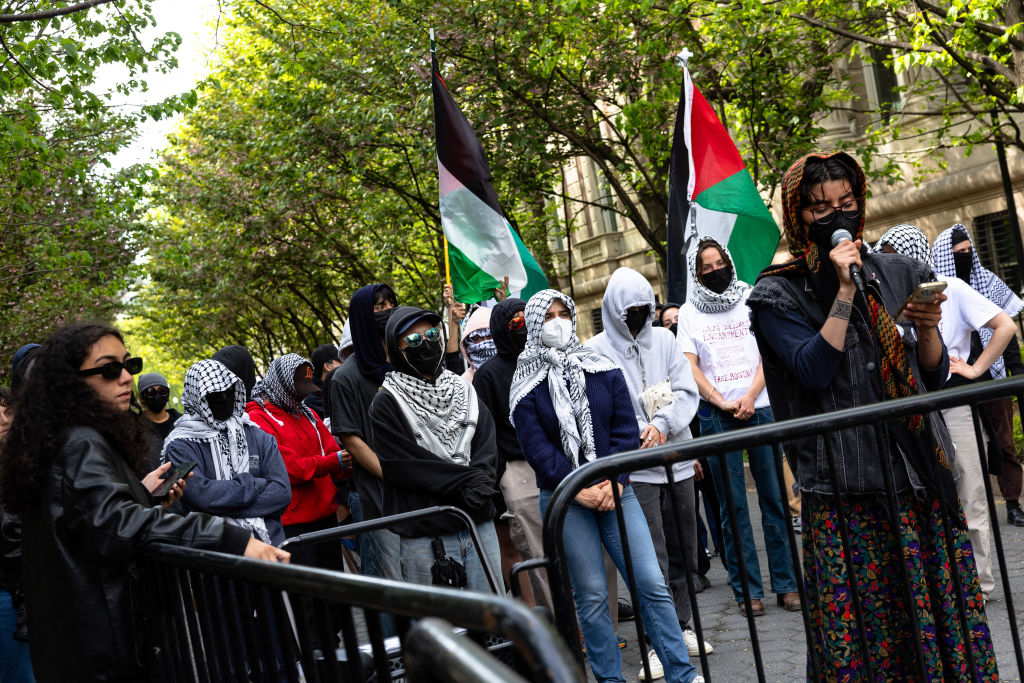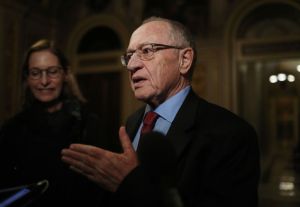Whether it’s Harvard, Pennsylvania or Berkeley, if there are large endowments and manicured lawns then, it seems, antisemitism is virulent. As the academic year is over, we need to discuss the bigotry that has been unleashed at elite universities across America. The latest example to hit the headlines occurred at Columbia University this week. Three deans have been “removed” for sending text messages containing antisemitic tropes in an incident that reveals much about the way elite antisemitism plays out in universities today.
Antisemitism has been a growing issue at Columbia for some months. In December, Columbia’s president was invited but, citing scheduling conflicts, declined to appear before a congressional hearing that exposed the evasive and legalistic way in which the presidents of Harvard and the University of Pennsylvania dismissed campus antisemitism. The university later became the site of student protests, with chants of “burn Tel Aviv to the ground” and one student in April arguing that “Zionists don’t deserve to live.” Just last month, the university settled a lawsuit with a Jewish student who accused the school of fostering an unsafe learning environment. So a panel discussion in May, which brought together students, alumni, professors and managers to discuss Jewish life on campus within the context of growing concern about antisemitism at the university, was a promising step forward.
Antisemitism is not confined to a handful of militant students
The panel discussion, held as part of a series of university-wide events, was a big deal. As such, it was attended by a number of the institution’s senior managers and administrators. Students and alumni described their experiences of antisemitism on campus, with one panelist breaking down in tears. But that didn’t stop students outside the event from attempting to re-establish a protest camp, while three of the deans present at the talk exchanged text messages — which were photographed and later published on the Washington Free Beacon.
The messages show the deans mocking the students, dismissing claims of antisemitism and suggesting that the events described were being exploited for “fundraising potential” — a thinly veiled reference to an ancient antisemitic trope. Other messages included “vomit emojis” in response to an article about antisemitism written by the campus rabbi. This week, Columbia has announced that the three deans will remain at the university but have been placed on indefinite leave.
Over the long summer vacation, university managers would be well-advised to learn lessons from Columbia. First up, they might note that antisemitism is not confined to a handful of militant students. Antisemitic attitudes are also to be found among the adults who are supposed to be running the show. They may not join protest marches calling for Tel Aviv to be burned to the ground, but they do seem to have a nasty habit of treating Jewish students differently.
Take, for example, the popular notion of “lived experience.” A certain type of academic loves nothing more than trading in “lived experiences.” The concept of “my truth” expressed in “auto-ethnography” seems to carry far more weight than any objective statistics. Except, that is, when it comes to Jewish students. When Jewish people talk about their “lived experience” of antisemitism on campus, the very same academics appear to be quick to question, probe and demand further evidence.
A similar double standard can be seen in the treatment of racism on campus. Today’s students already know that racism is a cardinal sin. At university, DEI managers and deans — in roles similar to the Columbia texters — teach them that racism is not what a person does or says, but how their words or actions are interpreted. In other words, if someone feels they have been racially harassed, then they are a victim of racism. In this context, they will learn about microaggressions. Complimenting someone’s hair style or success in math, they will be taught, is not polite but offensive. Except, that is, when it comes to Jewish students. In this case, it is fair to quibble over whether even calling for the obliteration of the world’s only Jewish state is really intended to be antisemitic. It’s no longer how an act is interpreted that counts, but only what was is actually meant.
Yet another double standard occurs in relation to academic freedom. The managers, administrators and deans who have spent the past decade backing student calls for speakers to be no-platformed, turning the university into a “safe space” and compiling “speech codes” dictating what can and cannot be said, are suddenly all in favor of free speech. Try to say a woman is an adult, human, female on campus and you’ll be greeted with petitions, restrictions and warnings. Say that Israel is engaged in genocide and that its defenders ‘do not deserve to live’ and managers will defend your right to free speech.
Ahead of the new academic year, those in charge of our elite universities have got to root out antisemitism. This means recognizing that vile prejudice does not always appear waving a placard and chanting. Sometimes it stems from mild-mannered academics or administrators. It rears its ugly head casually, routinely, dressed up in social justice garb and present in what is not said, as much as what is uttered aloud.
This article was originally published on The Spectator’s UK website.


























Leave a Reply